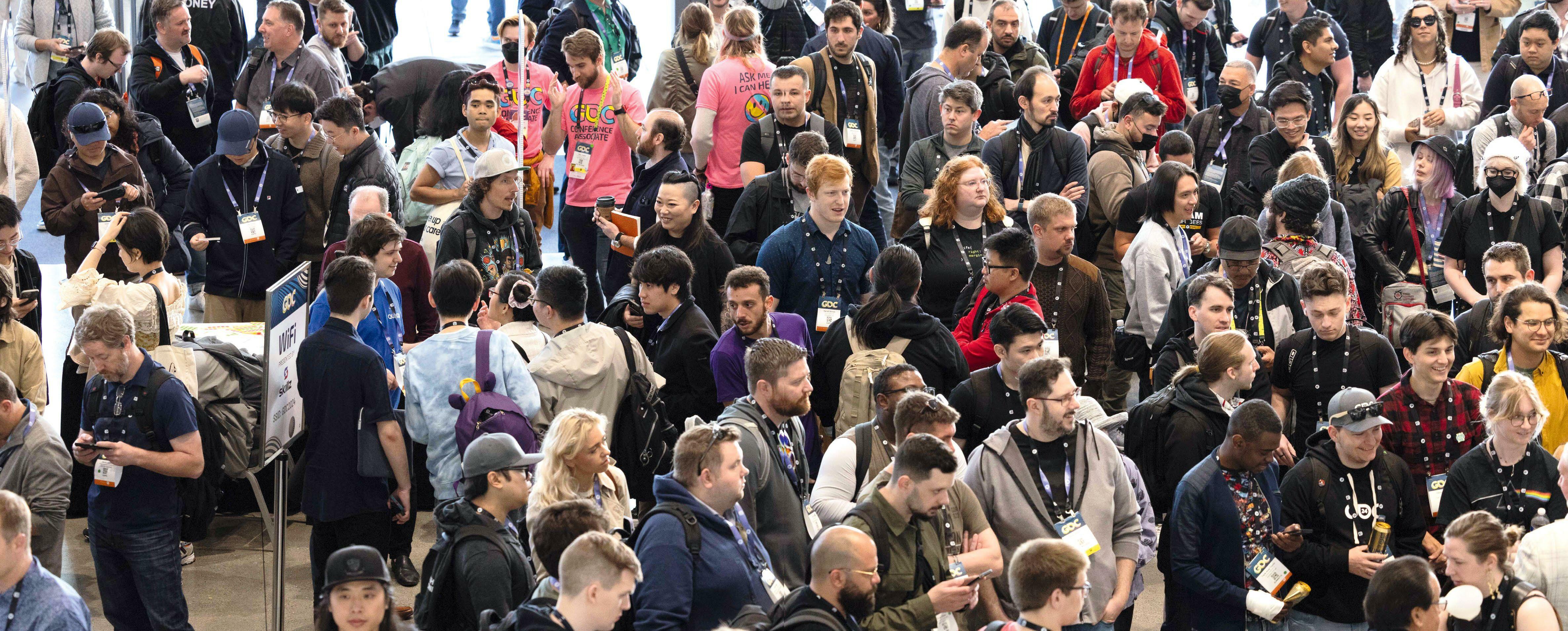No moment encapsulates that better, perhaps, than the ‘GDScream’: a protestcum-group-therapy session held in the Yerba Buena Gardens outside the official venue and organised by former Epic Games employees Scott Jon Siegel and Caryl Shaw. “The game industry is falling apart around us, and we’re all flocking to San Francisco for a week to pretend like this is fine,” read the event’s homepage. “Let’s take a minute where we all stop pretending, and express just how it feels to be a game developer in 2024. Join us for a collective moment of catharsis, camaraderie, and caterwauling." Dozens of show attendees - among them developers who had lost their jobs in the recent waves of industry layoffs, and others feeling the bitter impact of their colleagues being cast aside gathered to bellow their collective frustrations into the California sunshine. Speaking to PC Gamer, Siegel cited as motivation not only issues within the industry itself but also the rise of harassment and discrimination towards the game development community from so-called 'anti-woke' groups.
[https://cdn.magzter.com/1387349800/1713437535/articles/j6ZcI6IUK1713440145402/7843434463.jpg]
Meanwhile, inside the venue, Shaw and Siegel's former employer attempted to outline its vision of the future. Epic's State Of Unreal presentation kicked off with a look at Marvel 1943: Rise Of Hydra, the forthcoming game from Skydance New Media, headed by former Uncharted creative director Amy Hennig (who, having worked on more than her fair share of cancelled titles, is no stranger to industry instability). The trailer doubled as a showcase for Unreal Engine 5.4, with Hennig highlighting details such as volumetric smoke that can cast shadows on itself, along with dynamic creasing in its heroes' outfits, courtesy of machine learning. The star, however, was Epic's Meta-humans tech, which provides the game with some startlingly realistic faces for Captain America and Black Panther.
Elsewhere, the sense of frustration at the present state of the industry wasn't limited to the event's exterior. At the Game Developers Choice Awards, Larian Studios CEO Swen Vincke condemned the corporate greed “which has been fucking this thing up for so long”, in an off-the-cuff acceptance speech for the Best Narrative award. “I keep on seeing the same, same mistakes over and over and over, and it’s always the quarterly profits,” he said. “The only thing that matters is the numbers, and then you fire everybody and then next year you’re gonna say, ‘Shit, I’m out of developers’, and you’re gonna start hiring people again, and then you do acquisitions, and then you put them in the same loop again, and it’s just broken.”
His comments drew whoops and applause from the crowd, and he was far from the only person on stage to acknowledge the impact of layoffs and the corporate nature of big-league game production. “We’ve lost people with
years of experience who have worked hard to make some of the games nominated tonight,” awards host (and Sony Santa Monica writer) Alanah Pearce said in her opening monologue. “But more importantly, we’ve watched our friends get laid off, we’ve seen how
that impacts their families, their children…” At which point she was cut off by a ‘Please Wrap It Up’ message on screen, a cheeky dig at the hastily truncated acceptance speeches of 2023’s Game Awards in December.
Against this backdrop of anger at videogames' present, what of the companies trying to stake a claim on the industry's future? Several Web3 companies were in attendance, their flags somewhat tattered after the crypto crash of the past couple of years, that prospective direction seemingly dismissed. On the other hand, Godot's stand was noticeably big and bustling, the opensource game engine no doubt capitalising on the PR gaffes of Unity last year.
[https://cdn.magzter.com/1387349800/1713437535/articles/j6ZcI6IUK1713440145402/7134371871.jpg]
The biggest inroads onto the showfloor, though, were surely made by AI firms such as Inworld and modl.ai, while behind closed doors Ubisoft showed off its 'Neo NPC' demo, a proof of concept for conversations with AI characters created by Ubisoft's Paris studio in collaboration with Inworld's Large Language Model and Nvidia's Audio2Face application. Reminiscent of the latter company’s cyberpunk bartender demo from this year’s CES, as covered in E395, Ubisoft’s demo was no more convincing on the question of how well ‘freethinking’ NPCs can actually be integrated into a game, and whether that’s even desirable – especially if it comes at the expense of writers’ jobs.
It’s worth noting that, naturally, this technology isn’t free. During GDC, Game File’s Stephen Totilo spoke with the founder of the firm behind the Nvidia bartender demo, Convai’s Purnendu Mukherjee, who revealed that players’ comments were pinged to cloud servers to generate the bartender’s reply,...


